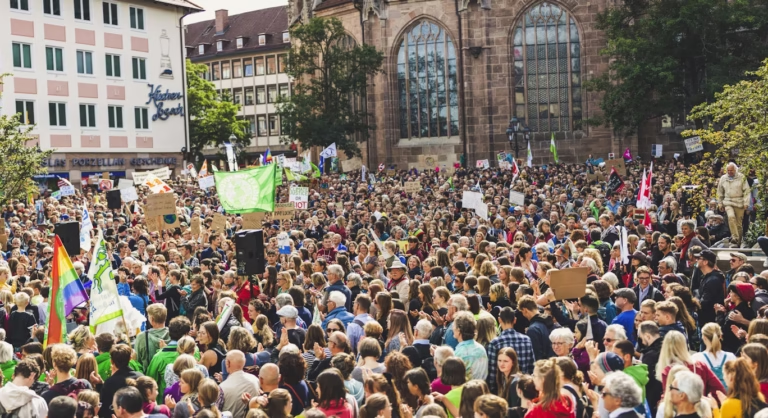There are moments in history when a single voice manages to turn an old fear into a modern movement.
Between 2010 and 2015, Nigel Farage did exactly that.
He didn’t invent the anxiety about outsiders, that primal unease that has flickered in human societies since the dawn of tribes. But he gave it a new vocabulary. He dressed it up in modern clothes and gave it airtime, microphones, and hashtags. He turned it from a whisper into a rallying cry.
And the world listened.

When Farage’s “Take Back Control” campaign caught fire during Brexit, it wasn’t just a political slogan. It was a cultural reset—a declaration that Britain’s openness was now up for debate. The “Breaking Point” poster, with its sea of refugee faces, became an emblem not of policy, but of panic. It legitimized suspicion. It made fear fashionable.
That, perhaps, was the moment when the world’s walls began to rise again.
The Echo That Crossed Oceans
Farage’s politics didn’t stay contained within Britain’s borders. They metastasized. They became a template, a manual for how to weaponize discontent.
And now, that echo is being heard everywhere.
Across the world, societies are standing at similar crossroads, reciting eerily identical lines. What began as a British experiment in populist nationalism is now unfolding in cities thousands of miles away.
Let’s look closer.
The United Kingdom: When the Monster Comes Home
In September 2025, London saw one of its largest anti-immigration rallies in decades, with over 100,000 people marching under the banner of “Stop the Boats.” The protests turned violent; officers were injured, flags were burned, and hate was chanted.
Farage’s party, Reform UK, stood behind the scenes like a conductor watching his orchestra come alive.
What he once hinted at, others now scream outright. Deportations, detentions, “Britain for the British”—ideas that once embarrassed polite society are now mainstream talking points.
Britain, once proud of its multicultural mosaic, is now at risk of shattering it.
Ireland: A Housing Crisis Turns Into a Human One
Ireland, too, has caught the contagion.
In Dublin and other areas, police officers dismantled tents that sheltered asylum seekers. Buildings meant to house refugees were burned. Protests erupted in small towns where people complained that newcomers were straining housing and jobs.
This was never about housing. The text addresses the concept of fear, particularly a fear that was legitimized by the language made popular by Farage. Outsiders are often viewed not as neighbors, but as competitors. That compassion is a luxury.
It’s the same playbook, just written in a different accent.
Canada: The Polite Country Starts to Flinch
Even Canada, traditionally regarded as a bastion of politeness, is no longer free from challenges.
As housing prices continue to rise and urban areas become increasingly crowded, the government has revealed an “immigration reset,” subtly reducing its intake goals.
It sounded pragmatic. But beneath that phrase lay the pressure of populism, the same suspicion that outsiders are the cause of internal problems.
Canada’s openness was never supposed to be conditional. And yet, here it is, being negotiated, trimmed, and tested.
Australia: From “Fair Go” to Fear First
On August 31st, thousands took to the streets across Sydney, Melbourne, and Brisbane in “March for Australia” protests demanding tighter migration controls. The slogans were hauntingly familiar, about “taking back” jobs, borders, and identity.
Sound familiar?
Farage’s influence is evident in this, not in a literal sense, but ideologically.
The narrative structure remains the same, utilizing the same emotional levers and the same illusion that keeping others out somehow ensures one’s nation remains safe.
The United States: The Mirror and the Megaphone
And across the Atlantic, America, the country built by outsiders, finds itself in an identity crisis of its own.
In 2025 alone, activists have recorded more than 700 protests related to immigration. Anti-migrant rhetoric dominates primetime debates.
Walls, bans, and deportations are not new words in American politics, but they’ve taken on a sharper edge in the Farage era.
What he exported wasn’t policy; it was permission. Permission to be openly hostile, publicly divisive, and politically cruel.
The Global Pattern: When Fear Goes Viral
Look at the pattern, and you’ll see it repeating like a political algorithm.
First comes frustration, economic, cultural, or existential.
Then comes a face, a voice, a Farage, a T***p; someone who names the frustration and gives it an enemy.
Next comes the rally, the hashtag, the slogan, and the movement.
And finally, comes the normalization: laws that mirror the mob and policies that mimic the protest.
This is how prejudice evolves. Quietly. Systemically.
One day, entire nations may forget that immigration isn’t an invasion but an inheritance.
What We’re Losing—Silently, Steadily
When a country closes itself off, the loss doesn’t arrive like an explosion; it creeps in like a slow leak.
We lose creativity—because innovation thrives when ideas collide.
We lose compassion—because empathy is a muscle that weakens when not used.
We lose our edge—because no nation can stay sharp without the friction of new perspectives.
And we lose our future—because demographically, economically, and culturally, we can’t grow by shrinking.
The irony is painful: the very nations leading the anti-immigrant movement are the ones that once grew rich on migration, trade, and global integration.
But Here’s Why All Is Not Lost
Because every time fear builds a wall, courage quietly builds a bridge.
Look closer and you’ll find them: students, entrepreneurs, educators, doctors, and artists crossing continents not to take, but to give.
They work in hospitals, teach in schools, innovate in labs, and pay taxes that sustain the systems that now debate their right to belong.
They bring fresh energy to aging nations, new languages to tired economies, and empathy to societies that seem to have forgotten it.
For every Farage shouting about division, there are thousands of migrants living examples of unity.
And for every border that shuts, there’s a young person somewhere still dreaming of crossing it, not to escape, but to contribute.
The Ending That Must Be Written Differently
Farage may have started the chorus, but he will not define the final song.
Because history, as it turns out, does not belong to those who divide—it belongs to those who build.
Every generation gets to choose what story it wants to tell about itself.
This one is being tested—asked whether it will let fear rewrite the definition of belonging.
But the future is stubborn. It keeps finding its way through cracks in the wall.
And in that persistence lies hope.
So yes, fear is loud. But kindness travels farther.
Yes, suspicion spreads quickly. But understanding endures longer.
And yes, politicians can weaponize hate. But humanity, time and again, has chosen to outgrow it.
The truth remains simple and eternal: the outsider you fear today may be the very person who will build your tomorrow.
Let’s not let fear write our future.
Let’s remember that nations rise not by closing their gates, but by opening their hearts.
Because the future doesn’t belong to those who hide from the world.
It belongs to those brave enough to welcome it.
Presented by IMFS—India’s most trusted study abroad guide since 1997.
Authored by K. P. Singh
Mentor | Educationist | Founder – IMFS
🌍 Empowering the Global Indian Student
www.imfs.co.in





